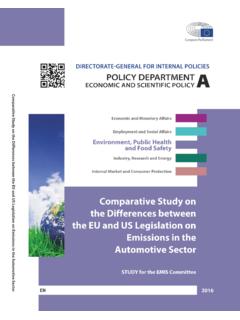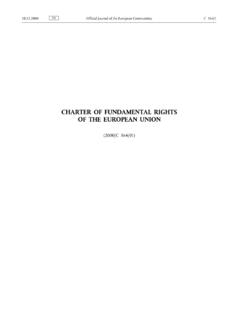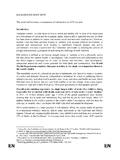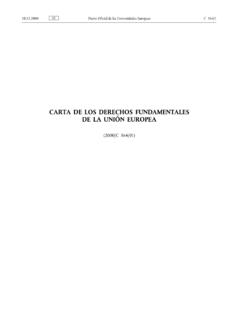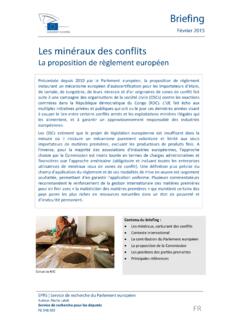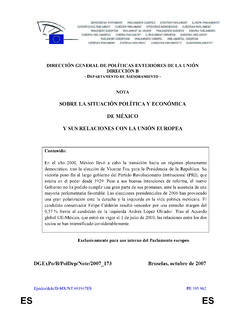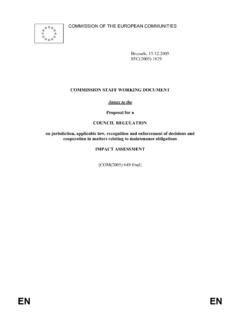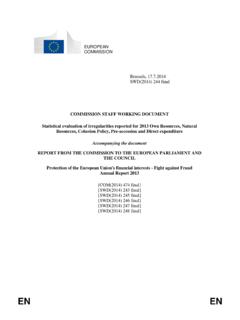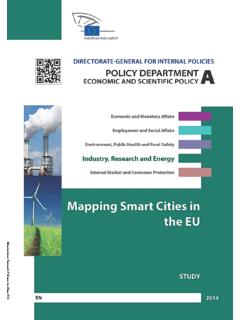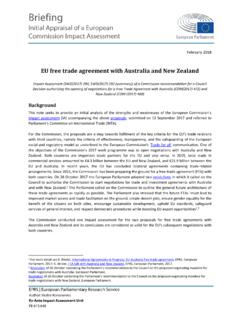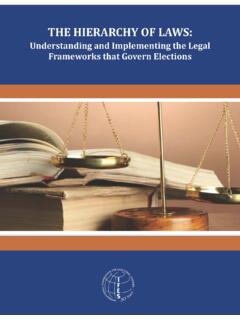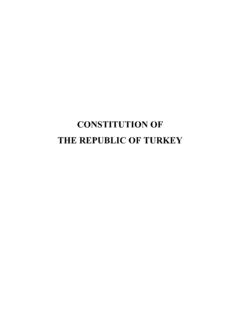Transcription of The Treaty of Lisbon - European Parliament
1 Fact Sheets on the European Union - 20181 THE Treaty OF LISBONThis fact sheet presents the background and essential provisions of the Treaty of Lisbon . Theobjective is to provide a historical context for the emergence of this latest fundamental EUtext from the ones which came before it. The specific provisions (with article references) andtheir effects on European Union policies are explained in more detail in the fact sheets dealingwith particular policies and BASIST reaty of Lisbon amending the Treaty on European Union and the Treaty establishing theEuropean Community (OJ C 306, ).
2 Entry into force on 1 December Lisbon Treaty started as a constitutional project at the end of 2001 ( European Councildeclaration on the future of the European Union, or Laeken declaration), and was followedup in 2002 and 2003 by the European Convention which drafted the Treaty establishing aConstitution for Europe (Constitutional Treaty ) ( ). The process leading to the LisbonTreaty is a result of the negative outcome of two referenda on the Constitutional Treaty inMay and June 2005, in response to which the European Council decided to have a two-year period of reflection.
3 Finally, on the basis of the Berlin declaration of March 2007,the European Council of 21 to 23 June 2007 adopted a detailed mandate for a subsequentIntergovernmental Conference (IGC), under the Portuguese presidency. The IGC concludedits work in October 2007. The Treaty was signed at the European Council of Lisbon on13 December 2007 and has been ratified by all Member and legal principlesThe Treaty establishing the European Community is renamed the Treaty on the Functioningof the European Union and the term Community is replaced by Union throughout the Union takes the place of the Community and is its legal successor.
4 The Lisbon Treaty doesnot create state-like Union symbols like a flag or an anthem. Although the new text is hence nolonger a constitutional Treaty by name, it preserves most of the substantial additional exclusive competences are transferred to the Union by the Lisbon , it changes the way the Union exercises its existing powers and some new (shared)powers, by enhancing citizens participation and protection, creating a new institutional set-up and modifying the decision-making processes for increased efficiency and transparency. Ahigher level of parliamentary scrutiny and democratic accountability is therefore the Constitutional Treaty , the Lisbon Treaty contains no article formally enshrining thesupremacy of Union law over national legislation, but a declaration was attached to the TreatyFact Sheets on the European Union - 20182to this effect (Declaration No 17), referring to an opinion of the Council s Legal Service whichreiterates consistent case-law of the Lisbon Treaty for the first time clarifies the powers of the Union.
5 It distinguishes threetypes of competences: exclusive competence, where the Union alone can legislate, and MemberStates only implement; shared competence, where the Member States can legislate and adoptlegally binding measures if the Union has not done so; and supporting competence, where theEU adopts measures to support or complement Member States policies. Union competencescan now be handed back to the Member States in the course of a Treaty Lisbon Treaty gives the EU full legal personality. Therefore, the Union obtains the abilityto sign international treaties in the areas of its attributed powers or join an internationalorganisation.
6 Member States may only sign international agreements that are compatible withEU Treaty for the first time provides for a formal procedure to be followed by MemberStates wishing to withdraw from the European Union in accordance with their constitutionalrequirements, namely Article 50 Treaty of Lisbon completes the absorption of the remaining third pillar aspects of the areaof freedom, security and justice (FSJ), police and judicial cooperation in criminal matters,into the first pillar. The former intergovernmental structure ceases to exist, as the acts adoptedin this area are now made subject to the ordinary legislative procedure (qualified majority andcodecision), using the legal instruments of the Community method (regulations, directives anddecisions) unless otherwise the Treaty of Lisbon in force, the European Parliament is able to propose amendmentsto the Treaties, as was already the case for the Council, a Member State government or theCommission.
7 Normally, such an amendment would require the convocation of a Conventionwhich would recommend amendments to an IGC (the European Council could, however, decidenot to convene such a Convention, subject to Parliament s consent (Article 48(3) TEU, secondparagraph)). An IGC could then be convened to determine amendments to the Treaties bycommon accord. It is, however, also possible to revise the Treaties without convening an IGCand through simplified revision procedures, where the revision concerns the internal policiesand actions of the Union (Article 48(6) and 48(7) TEU).
8 The revision would then be adopted asa decision of the European Council, but might remain subject to national ratification democracy and better protection of fundamental rightsThe Treaty of Lisbon expresses the three fundamental principles of democratic equality,representative democracy and participatory democracy. Participatory democracy takes the newform of a citizens initiative ( ).The Charter of Fundamental Rights is not incorporated directly into the Lisbon Treaty , butacquires a legally binding character through Article 6(1) TEU, which gives the Charter the samelegal value as the Treaties ( ).
9 The process of the EU s accession to the European Convention on Human Rights (ECHR) wasopened when the 14th protocol to the ECHR entered into force on 1 June 2010. This allows notonly states but also an international organisation, the European Union, to become signatoriesof the ECHR. Accession still requires ratification by all states that are parties to the ECHR, aswell as by the EU itself. Negotiations between Council of Europe and EU representatives led tothe finalisation of a draft agreement in April 2013, which, however, was deemed incompatiblewith Article 6 TEU by the Court of Justice of the European Union in its Opinion 2/2013.
10 Furthernegotiations will be necessary before accession can take Sheets on the European Union - new institutional European ParliamentPursuant to Article 14(2) TEU, the EP is now composed of representatives of the Union scitizens , not of representatives of the peoples of the States (Article 189 TEC).The EP s legislative powers have been increased through the ordinary legislative procedure ,which replaces the former codecision procedure. This procedure now applies to more than40 new policy areas, raising the total number to 73. The assent procedure continues to exist as consent , and the consultation procedure remains unchanged.
